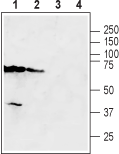Overview
- Peptide (C)RAGLKSTKELIPTPAD, corresponding to amino acid residues 481-496 of mouse SLC47A2 (Accession Q3V050). 6th intracellular loop.
- Mouse kidney and testis lysates (1:200-1:1000).
 Western blot analysis of mouse kidney (lanes 1 and 3) and mouse testis (lanes 2 and 4) lysates:1,2. Anti-SLC47A2 Antibody (#ANT-132), (1:200).
Western blot analysis of mouse kidney (lanes 1 and 3) and mouse testis (lanes 2 and 4) lysates:1,2. Anti-SLC47A2 Antibody (#ANT-132), (1:200).
3,4. Anti-SLC47A2 Antibody, preincubated with SLC47A2 Blocking Peptide (#BLP-NT132).
Solute carriers control the efflux and uptake of crucial compounds such as sugars, amino acids and ions in cells and organelles1. Multidrug and toxin extrusion proteins, also known as MATEs are responsible for the efflux of organic cations, endogenous compounds and drugs from cells. The driving force for this transport is derived from an oppositely directed proton gradient thus making MATE transporters secondary active transporters. MATEs work in concert with OCTs (Organic cation transporters). While the latter are located in the basolateral cell membrane of proximal tubules cells MATEs are expressed on the apical membrane2. MATEs can also transport zwitterions and anionic compounds in addition to cations.
MATE2 carrier is part of the SLC47 family encoded by the SLC47A2 gene, predominantly expressed in apical brush border membranes of the proximal tubules in kidneys. It exhibits proton gradient dependent secretion of cationic drugs across the membrane. It is predicted to have 12 transmembrane helices similar to other MATE family members but also an additional COOH-terminal helix. Histidine and Cysteine residues in positions 382, 59 and 123 respectably are required for MATE2 proper functioning3.
Metformin, a commonly used hypoglycemic agent and platinum based chemotherapeutics are mainly excreted by MATE transporters in the kidney. Changes in the expression of MATEs can dramatically influence the concentration of these substances in the body and cause serious side effects. In a recent study, pyrimethamine, an inhibitor of MATE transporters reduced metformin renal clearance by 35%4. Inhibition of MATE transporters by anti-neoplastic drugs can play a role in chemosensitivity of cancerous cells. MATEs are a potential target for prevention of resistance to treatment and toxicity during chemotherapy5.
